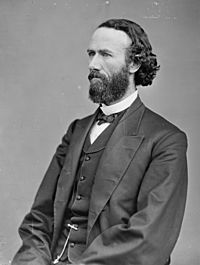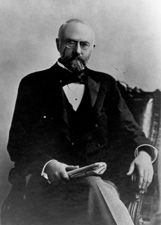John B. Henderson facts for kids
Quick facts for kids
John B. Henderson
|
|
|---|---|
 |
|
| United States Senator from Missouri |
|
| In office January 17, 1862 – March 3, 1869 |
|
| Preceded by | Trusten Polk |
| Succeeded by | Carl Schurz |
| Member of the Missouri House of Representatives | |
| In office 1856–1858 1848–1850 |
|
| Personal details | |
| Born |
John Brooks Henderson
November 16, 1826 Danville, Virginia |
| Died | April 12, 1913 (aged 86) Washington, D.C. |
| Political party | Democrat, Unionist, Republican |
| Spouse | Mary Foote |
| Profession | Politician, Lawyer, Teacher |
| Signature | |
| Military service | |
| Branch/service | Missouri Militia |
| Rank | Brigadier General |
John Brooks Henderson (born November 16, 1826 – died April 12, 1913) was an important American politician. He served as a U.S. Senator for the state of Missouri. One of his biggest achievements was helping to write the Thirteenth Amendment to the United States Constitution. This amendment officially ended slavery in the United States. He also played a special role in a big investigation, becoming known as the first "special prosecutor."
Contents
Early Life and Career
John Brooks Henderson was born near Danville, Virginia. He later moved with his family to Lincoln County, Missouri. As a young man, he worked on a farm. He also studied on his own and became a teacher. In 1844, he passed the exam to become a lawyer. After that, he started his own law practice.
Political Journey
Henderson began his political career in the Missouri House of Representatives. He served there from 1848 to 1850 and again from 1856 to 1858. He was very active in the Democratic Party.
In 1861, he became a brigadier general in the Missouri State Militia. He led federal troops in the northeast part of Missouri.
On January 17, 1862, Henderson was chosen to be a U.S. Senator. He filled a spot that became empty when another senator was removed. Later that same year, he was elected to serve a full six-year term in the Senate.
The 13th Amendment
As a Senator from a state that allowed slavery, Henderson took a brave stand. He helped write and support the Thirteenth Amendment to the United States Constitution. This amendment made slavery illegal forever in the United States.
Henderson first suggested his idea for the amendment on January 11, 1864. This idea was then combined with proposals from other lawmakers. On January 31, 1865, the U.S. Congress approved the 13th Amendment. President Abraham Lincoln signed it the very next day. Sadly, Lincoln was assassinated on April 14, 1865. This happened before the amendment was fully approved by all the states. The state of Georgia was the last to approve it on December 6, 1865.
While in the Senate, Henderson also worked on important committees. He was involved with auditing expenses and dealing with Native American affairs.
Important Senate Vote
During the impeachment trial of President Andrew Johnson, Henderson made a difficult choice. He was a Republican, but he voted against removing President Johnson from office. Nine other Republican senators also voted this way. They believed the trial was not fair. Henderson left the Senate on March 3, 1869. He did not run for reelection.
Later Life and Public Service
After leaving the Senate, Henderson tried to become Governor of Missouri. He also ran for U.S. Senator again, but he was not successful.
In 1875, President Ulysses S. Grant asked Henderson to be a special U.S. attorney. His job was to investigate a large fraud case known as the Whiskey Ring. This was a group of people who avoided paying taxes on whiskey. Henderson was later removed from this role. However, he is still remembered as the first "special prosecutor" in U.S. history.
In 1877, Henderson was appointed to help negotiate with Native American tribes. He moved to Washington, D.C. in 1888. He lived there until he passed away in 1913. He was buried in Green-Wood Cemetery in Brooklyn, New York.
 | Jewel Prestage |
 | Ella Baker |
 | Fannie Lou Hamer |


